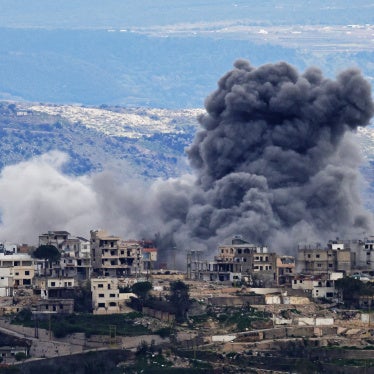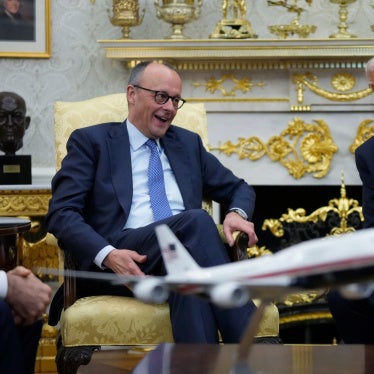There is no denying Turkish Prime Minister Recep Tayyip Erdogan's talent as a politician, or the considerable popular support he enjoys. But under this charismatic leader, Turkey is embarking on a dangerous experiment of undermining basic rights and the rule of law as constraints on majoritarian rule. As I saw on a recent visit to Turkey to meet with senior officials, a major corruption scandal has triggered Erdogan's worst autocratic reflexes, undermining the foundation of Turkey's democracy.
To give credit where due, Erdogan, during the 11-year rule of his Islamic-rooted Justice and Development Party (AKP), can boast of a booming economy and enormous political progress. The atrocity-ridden repression of a Kurdish insurgency has wound down, with talks under way to end the conflict and with growing respect for the cultural rights of the country's large Kurdish minority. Religious freedom for the Sunni majority has been enhanced: Bans on women wearing headscarves in public-service jobs and universities have been removed without imposing the religious puritanism of harsher forms of Islamic rule. Systematic torture in police custody has ended, though the police's use of excessive force remains a problem. Turkey is also being impressively generous to the estimated 700,000 refugees from the horrible atrocities being committed next door in Syria.
For several years, Turkey's hope of entering the European Union encouraged reform. But the opposition of some key EU states, articulated most clearly by German Chancellor Angela Merkel and former French President Nicolas Sarkozy, undermined Turkey's accession hopes. The dashing of EU prospects slowed reform and contributed to some reversals, but it is only in the last year or so that Erdogan has begun to take major steps backward on basic rights.
The most obvious manifestation of Turkey's eroding freedoms occurred a year ago, during the so-called Gezi Park protests. Erdogan took these demonstrations, which were launched to oppose his plan to build a shopping center at the site of one of central Istanbul's last parks, as a personal affront. He saw them as a revolt by an urban elite, allegedly part of an international conspiracy, to topple the pious conservative majority from the Anatolian heartland that he had brought into the halls of government. Police responded to the sit-ins by violently dispersing them with water cannons and tear gas. The scenes were repeated as the demonstrations grew and spread to other cities. In many cases, police fired tear-gas canisters at demonstrators' heads, seriously injuring scores and killing several.
Erdogan has cracked down on not only protesters in the streets but also investigators within Turkey's state institutions. In December, prosecutors produced evidence of corruption in Erdogan's government. Four ministers resigned, and, most damaging, an audiotape was leaked in which Erdogan apparently tells his son, on the morning that the corruption scandal broke, to remove large amounts of cash from their home and conceal it with relatives and associates. Erdogan has said vaguely that the recording, along with other incriminating leaked tapes, are "fake," a "montage," and part of a nebulous conspiracy to overthrow him, but he has failed to produce evidence to substantiate these claims.
Erdogan's response to the corruption investigation shows both the extent of his power and his disregard for the basic safeguards of a democratic society. Turkey's mainstream media is largely owned by conglomerates that are vulnerable to economic retaliation and political pressure -- and therefore are all too ready to dismiss journalists and columnists who criticize Erdogan. Several tapes suggest that, in some instances, journalists have been fired after the direct intervention of Erdogan himself, while others have been prosecuted for criminal defamation following complaints from Erdogan and his allies. Almost none of the mainstream media headlined the bombshell revelation of the father-son conversation to hide huge sums of cash, at most alluding to it tangentially.
As a result, Turks took to social media to learn about the leaks. The tapes were posted on YouTube and disseminated via Twitter, where critics of the government wrote freely about the corruption allegations. Erdogan's response was to shut down access to both sites, only reluctantly reopening Twitter access after the Constitutional Court ordered it -- and after his party had convincingly won pivotal local elections in March. YouTube remains officially blocked in Turkey.
Meanwhile, the AKP-dominated parliament adopted a new intelligence law that criminalizes not only the leaking of secret official information but also its publication, punishable by a prison term of up to nine years. That would be comparable to the United States prosecuting not only Edward Snowden for leaking intelligence documents, but also the journalists who won the Pulitzer Prize for writing about his revelations. The law also gives the intelligence services unfettered access without a court order to ordinary people's private data, while immunizing from prosecution any intelligence agent acting in the course of his official duties.
As for the investigation into his government's corruption, Erdogan quickly intervened to quash the probe. He ordered the reassignment of thousands of police officers and hundreds of judges and prosecutors, and the four prosecutors who started the corruption investigation are now themselves under investigation. New prosecutors, in turn, have begun to dismiss the corruption cases. At the same time, Erdogan's government adopted a law granting greater executive control over the body that administers the judiciary, which can affect the career prospects of judges and prosecutors.
Erdogan seems to see his considerable electoral support as justification for such moves. He may think the public is willing to overlook corruption -- but that assumes there has been a public airing of the corruption allegations, which Erdogan's censorship has been designed to thwart. It also assumes that a public vote can justify undermining basic rights by suppressing public protest, censoring the media, and interfering with judicial independence.
As Erdogan amplifies his complaints about an alleged plot to overthrow his government, he has accused his onetime ally, Fethullah Gulen, of being the ringleader. Gulen, a Sunni Muslim cleric who left Turkey over a decade ago for, of all places, rural Pennsylvania, where he has been based ever since, presides over a loyal, almost cult-like following, nurtured by a vast network of widely respected private schools in Turkey and across the globe. The network is known in Turkey for identifying talented people and encouraging them to become judges, prosecutors, and police, leading to its alleged domination of law enforcement institutions. Until recently, it proceeded without AKP objection.
As AKP allies, the Gulenists undoubtedly played a leadership role in the prosecution and media coverage of two mass trials of senior military officials that cemented civilian control of the military. Known as the Ergenekon and Sledgehammer trials, each charged hundreds of military officials, along with their alleged civilian allies, with plotting to overthrow the government. The trials were replete with due process problems and allegedly concocted evidence. Hundreds were convicted.
However, in recent years, the cracks in the alliance between the Gulenists and the AKP grew wider and wider. Some Gulenists were upset with Erdogan's negotiations with the rebel Kurdistan Workers' Party (PKK). Gulenist prosecutors, after all, had overseen the mass arrests and trials of thousands of pro-PKK Kurdish activists, lawyers, and journalists. In 2012, these prosecutors even moved to investigate Erdogan's envoy to the PKK for alleged treason and collaborating with terrorists.
Erdogan, in turn, first moved against one of the Gulenists' greatest sources of influence and revenue by proposing to close down Turkey's private supplementary and preparatory schools, of which the Gulenists control a significant proportion. He then accused the Gulenists of orchestrating the corruption investigations and leaks, portraying the Gulenists as a dark force running a "parallel state" with international collaboration in a conspiracy against him. He has vowed to seek Gulen's extradition from the United States, though it is unclear on what charges, and the likelihood of success is remote.
Erdogan is assessing his political options. While his efforts to pass constitutional reforms that would usher in a fully empowered presidential system have faltered, he is still likely to run for president. Although the office remains a largely ceremonial position, it will grow in stature when the president is elected by popular referendum for the first time in August. The word on the street is that Erdogan would like to be president through 2023, when Turkey celebrates its centenary as a modern nation following the demise of the Ottoman Empire. Erdogan would presumably handpick his successor as prime minister. President Abdullah Gul, also a founder of the AKP, has rejected suggestions that he could become premier, nixing the possibility of a maneuver similar to the swapping of leadership positions perfected by Russia's Vladimir Putin and Dmitry Medvedev.
I met in April with Gul, along with another possible prime ministerial successor, AKP Deputy Chairman Numan Kurtulmus. Both listened carefully to my concerns about Erdogan's authoritarian drift and neither seemed surprised to hear them, but his power as AKP leader means they must tread carefully. Other leading figures in government have mostly remained silent for the same reason.
As Turkey contemplates its political future, far more is at stake than the fate of a controversial politician. Like other long-serving leaders, Erdogan has acquired a growing number of opponents. A committed democratic leader would bow to that reality, recognizing that a nation's democracy is more important than his individual political fate. Moreover, a leader with foresight would recognize that undermining democratic institutions sets precedents that endanger himself and his followers when, inevitably, they find themselves outside the corridors of power.
But Erdogan seems to be dangerously conflating his own political future with his country's best interest. For much of the past decade, the two coincided, but as street protests and official corruption plague him, Erdogan's growing autocracy has replaced the military as the greatest threat to Turkey's prospects as a rights-respecting democracy.
The stakes extend well beyond Turkey. Until recently, Erdogan's blend of democracy and political Islam stood as a rebuke to those who claim the two cannot coexist. From the former Soviet republics of Central Asia to the Arab nations of the Middle East and North Africa, Turkey could be a beacon of democratic hope. And while Turkey's EU accession hopes now seem remote, the prospect of a Muslim, democratic, and economically ascendant Turkey might have helped Europe address its own growing diversity, while offering a bridgehead to tumultuous but important nations to the east.
But with Erdogan's deepening authoritarian streak, these visions of Turkish leadership seem sadly outdated. For the benefit of the people of Turkey and for those in the region who still look to it with hope, Erdogan urgently needs to recommit himself to human rights and the rule of law.







